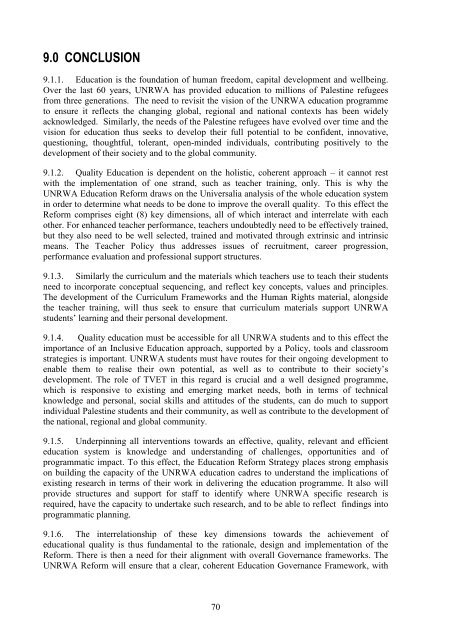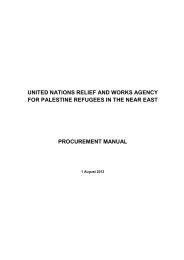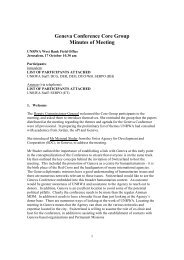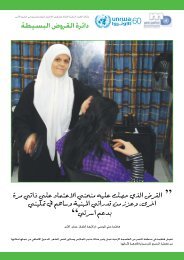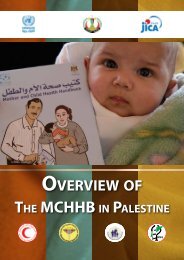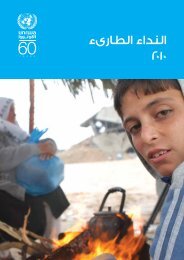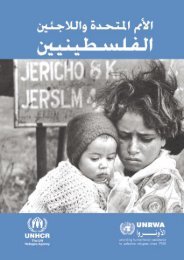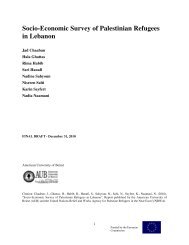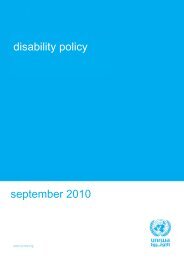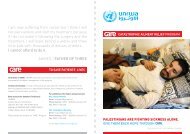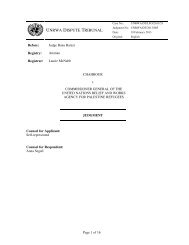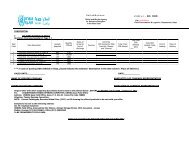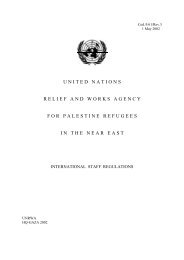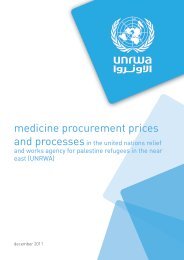Education Reform Strategy - Unrwa
Education Reform Strategy - Unrwa
Education Reform Strategy - Unrwa
You also want an ePaper? Increase the reach of your titles
YUMPU automatically turns print PDFs into web optimized ePapers that Google loves.
9.0 CONCLUSION<br />
9.1.1. <strong>Education</strong> is the foundation of human freedom, capital development and wellbeing.<br />
Over the last 60 years, UNRWA has provided education to millions of Palestine refugees<br />
from three generations. The need to revisit the vision of the UNRWA education programme<br />
to ensure it reflects the changing global, regional and national contexts has been widely<br />
acknowledged. Similarly, the needs of the Palestine refugees have evolved over time and the<br />
vision for education thus seeks to develop their full potential to be confident, innovative,<br />
questioning, thoughtful, tolerant, open-minded individuals, contributing positively to the<br />
development of their society and to the global community.<br />
9.1.2. Quality <strong>Education</strong> is dependent on the holistic, coherent approach – it cannot rest<br />
with the implementation of one strand, such as teacher training, only. This is why the<br />
UNRWA <strong>Education</strong> <strong>Reform</strong> draws on the Universalia analysis of the whole education system<br />
in order to determine what needs to be done to improve the overall quality. To this effect the<br />
<strong>Reform</strong> comprises eight (8) key dimensions, all of which interact and interrelate with each<br />
other. For enhanced teacher performance, teachers undoubtedly need to be effectively trained,<br />
but they also need to be well selected, trained and motivated through extrinsic and intrinsic<br />
means. The Teacher Policy thus addresses issues of recruitment, career progression,<br />
performance evaluation and professional support structures.<br />
9.1.3. Similarly the curriculum and the materials which teachers use to teach their students<br />
need to incorporate conceptual sequencing, and reflect key concepts, values and principles.<br />
The development of the Curriculum Frameworks and the Human Rights material, alongside<br />
the teacher training, will thus seek to ensure that curriculum materials support UNRWA<br />
students’ learning and their personal development.<br />
9.1.4. Quality education must be accessible for all UNRWA students and to this effect the<br />
importance of an Inclusive <strong>Education</strong> approach, supported by a Policy, tools and classroom<br />
strategies is important. UNRWA students must have routes for their ongoing development to<br />
enable them to realise their own potential, as well as to contribute to their society’s<br />
development. The role of TVET in this regard is crucial and a well designed programme,<br />
which is responsive to existing and emerging market needs, both in terms of technical<br />
knowledge and personal, social skills and attitudes of the students, can do much to support<br />
individual Palestine students and their community, as well as contribute to the development of<br />
the national, regional and global community.<br />
9.1.5. Underpinning all interventions towards an effective, quality, relevant and efficient<br />
education system is knowledge and understanding of challenges, opportunities and of<br />
programmatic impact. To this effect, the <strong>Education</strong> <strong>Reform</strong> <strong>Strategy</strong> places strong emphasis<br />
on building the capacity of the UNRWA education cadres to understand the implications of<br />
existing research in terms of their work in delivering the education programme. It also will<br />
provide structures and support for staff to identify where UNRWA specific research is<br />
required, have the capacity to undertake such research, and to be able to reflect findings into<br />
programmatic planning.<br />
9.1.6. The interrelationship of these key dimensions towards the achievement of<br />
educational quality is thus fundamental to the rationale, design and implementation of the<br />
<strong>Reform</strong>. There is then a need for their alignment with overall Governance frameworks. The<br />
UNRWA <strong>Reform</strong> will ensure that a clear, coherent <strong>Education</strong> Governance Framework, with<br />
70


